How To Get Rid Of Aphids Naturally To Eliminate Them
It is best to prevent aphids by keeping weeds in check and keeping the plant healthy. If you still have an infestation, using a homemade or store bought spray can help. In worst case you might have to cut off the infected branches.
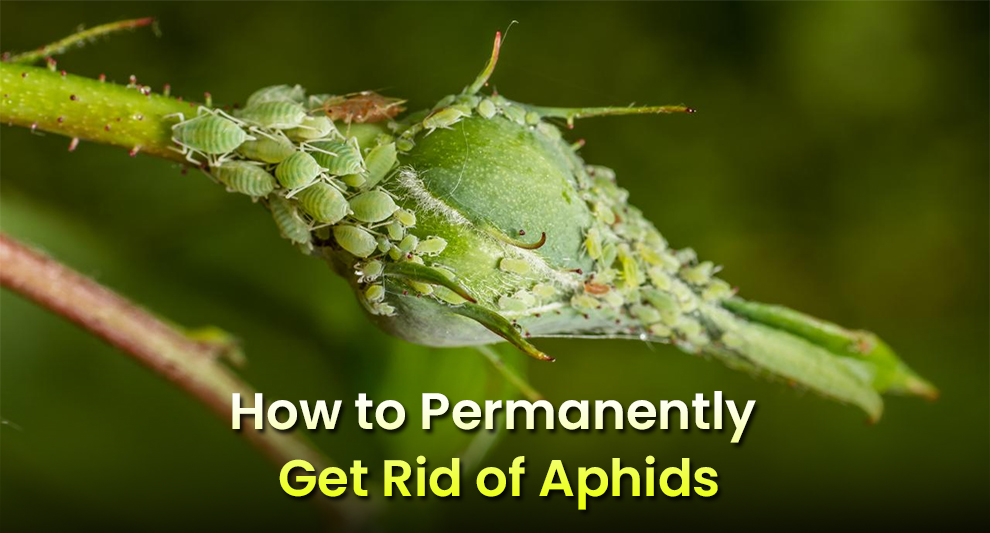
Sadly, not many know that most gardeners host a bunch of aphids. These common insects do not inflict much damage on healthy plants.
Aphids are typically problematic when things go out of whack. It can happen when plants are stressed because of overcrowding, poor soil conditions, and drought. Sadly, during such situations, the aphids reproduce at an alarmingly high speed in only a few days, producing a massive, hungry colony that can suck the life out of your plants.
Home growers and hobbyist gardeners worried about ‘how to get rid of aphids permanently,’ we have some news for you. Fortunately, there are multiple ways that can help control and combat aphids without using dangerous chemicals in the garden.
Aphids have several natural enemies, such as other insects. These move slowly. Hence, it is easier to remove them with sprays or hands. However, aphids multiply quickly. Thus, you may have to incorporate multiple methods to completely and permanently control them.
Regardless, be patient and persistent. It may take some time, but if you know how to control aphids and do it right, you will see results in a little while.
Moreover, beneficial insects, such as ladybugs, can help get rid of these pesky creatures. The best way to combat these small yet destructive pests is to know when you must take action and then employ the right tricks to keep them in check.
What Are Aphids?
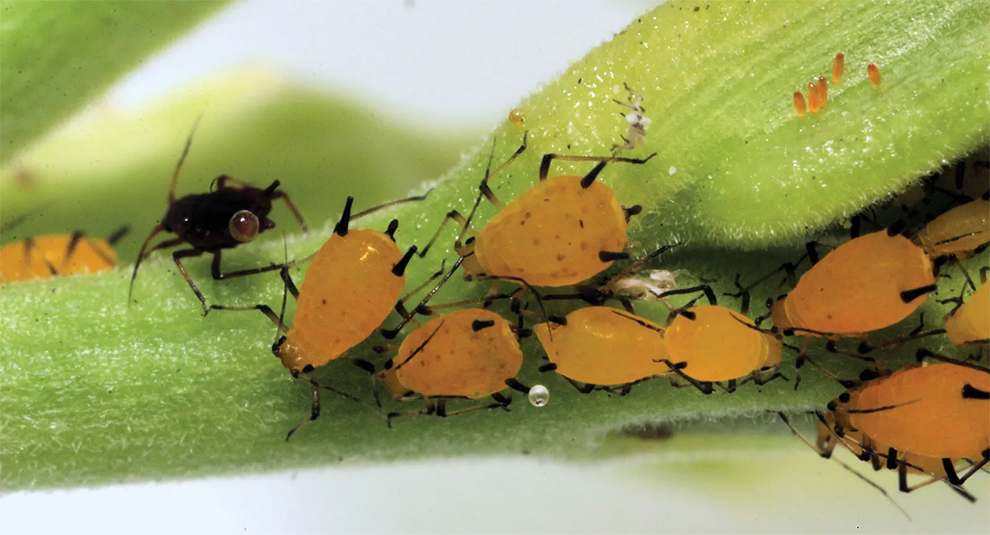
Aphids are soft-bodied, small insects (adults are under ¼-inch) with pear-shaped bodies and long, slender mouthparts that they employ to pierce leaves, stems, and other tender plant parts, which suck out the fluids.
The young aphids and the older ones look almost similar. Almost every plant has one or more aphid species that occasionally feed on them. Sadly, many species are tricky to distinguish and may be invisible to the naked eye. However, if you know how to eliminate aphids, you can control almost all the species.
Most species look light green, yellow, gray, brown, white, pink, or black. However, some may even have a woolly or waxy coating. Almost all of them have two short tubes projecting from the hind end. They are typically wingless, but most species may form a winged form when in a crowded population.
Hence, the insects move to other plants whenever the food quality suffers. So, they reproduce and build a new colony in the new location. Usually, they occur in large groups, but you may occasionally see them in small numbers or singly.
While aphids can feed on various plants, different species have specific plant preferences. For instance, some aphids comprise potato aphids, cabbage aphids, bean aphids, woolly apple aphids, and melon aphids.
What Causes Aphid Infestation?
Before discussing how to get rid of aphids permanently, you must know the factors conducive to their growth. So, here are some responsible factors for aphid infestation:
1. Lack of natural predators: The aphid population can explode if the surrounding lacks adequate natural predators, such as lacewings and ladybugs.
2. Poor plant health: Stressed or weak plants are more likely to invite aphid infestations. Hence, ensure that the plants are well-nourished and healthy to avoid infestations.
3. Environmental conditions: Aphids thrive in humid and warm conditions. So, weather conditions that elevate their growth can also result in an infestation.
4. Seasonality: Aphids are most prevalent in summer and spring when the temperature is warmer and plant growth is high.
5. Lack of diversity: Growing a single plant species can attract aphids and make their spread easier.
6. Transportation: You can transport the aphids from one location to another via human activity, wind, or animals. It can also result in infestations in the new areas.
7. Over-fertilization: Over-fertilizing can build an environment conducive to aphid reproduction and growth.
How To Get Rid Of Aphids Naturally?
When the aphid population explodes and starts causing visible damage to the buds, leaves, and stems, you must immediately act upon it. The sooner you take remedial action, the better the possibility of saving the plants. Here are some methods that can help:
1. Hose them
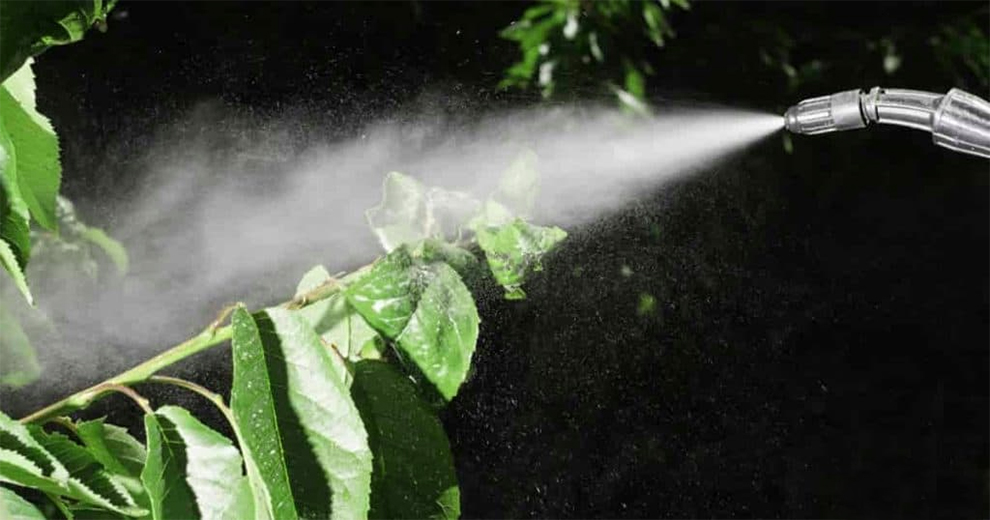
Hosing is one of the best ways to eliminate aphids. It is simple and works effectively. So, wash the aphids off with a high-pressure water jet using a watering hose and a regulated nozzle. While doing so, hold onto the weaker branches and plant stems to ensure they do not break off. If you have a dense bush, normal water pressure might not work. So, employ a bug blaster nozzle instead. This tactic works because:
- The aphids that do not get hit by water drown in the vast volume of water.
- High-pressure strokes can kill the bugs by reaping them apart.
2. Manual removal
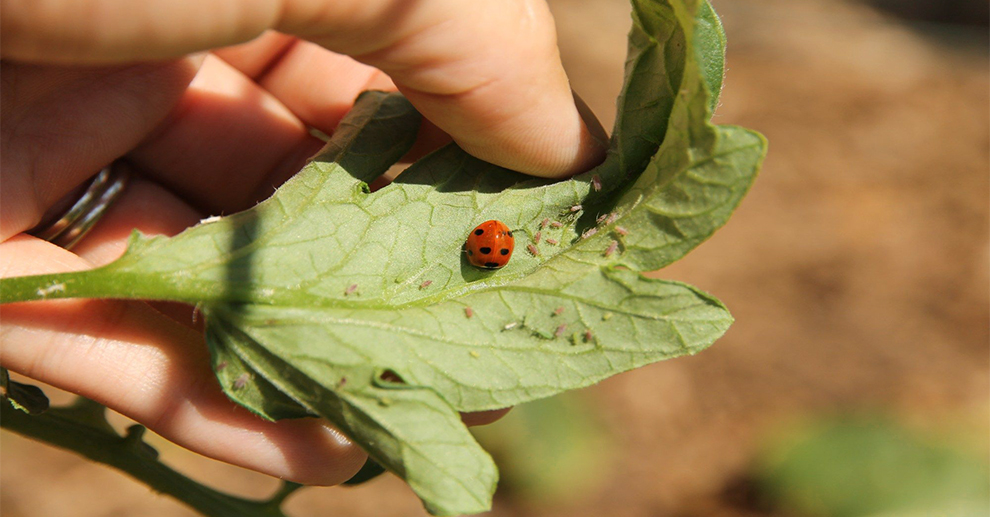
If the infestation is not widespread you can manually remove the aphids and kill them. All you have to do is rub your fingertips and thumb over the plants’ stems and leaves whenever and whenever you spot the aphids.
Please know aphids are delicate and soft. So, you can crush them even with light pressure. This strategy might not help you eliminate every bug, but your plant will grow healthy leaves again. Inspect every few days to check if you need a repeat procedure.
3. Can vinegar kill aphids?
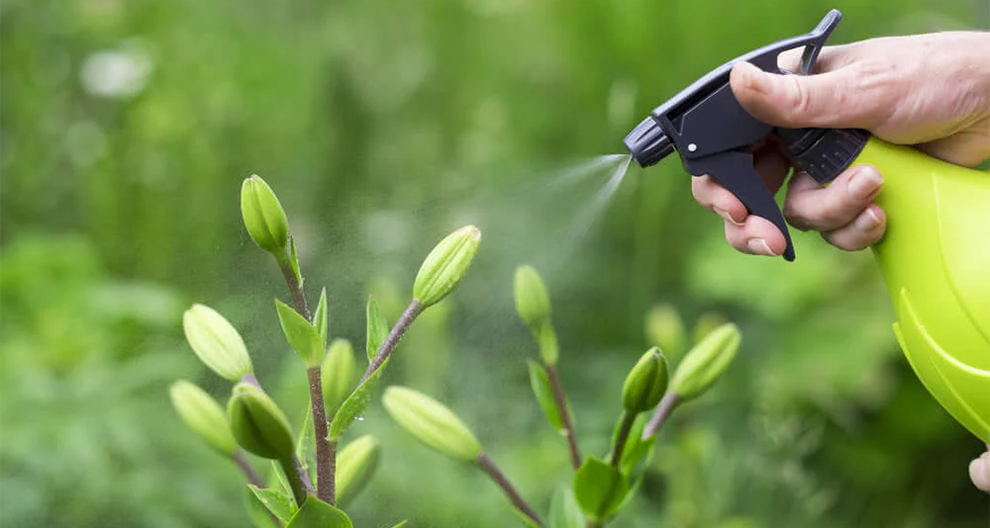
Yes, vinegar can be beneficial in killing aphids, but it might not be the most practical or efficient method of controlling the infestation. Here are some things you need to bear in mind:
- Vinegar is a contact spray, meaning it will work only if in direct contact with the aphids. Hence, it cannot treat large infestations or tackle those inaccessible areas.
- Vinegar is a non-toxic, natural solution. However, it damages the plants if applied too frequently or too heavily. Hence, you must dilute the vinegar with water and do a test in the small area of the plant to ensure that it does not cause any harm.
Thus, vinegar is an effective natural remedy to control aphids, but be cautious and employ it in conjunction with other methods for the best results.
4. Does soapy water kill aphids?
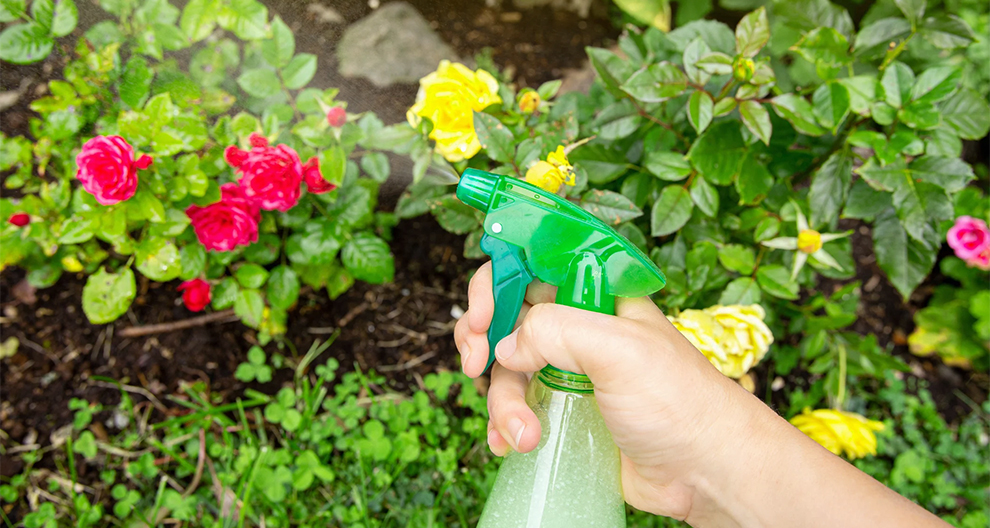
Yes, soapy water can be an inexpensive and effective way of controlling the aphid infestation on the plant. The soap will break down the waxy coating of the aphids. It dehydrates and eventually kills them. Here is how you can make soapy water for use as an insecticidal spray:
- Take one to two teaspoons of mild liquid soap. Mix it with one quart of water in a spray bottle.
- Shake the bottle thoroughly to mix the solution.
- Spray this solution directly onto the aphids and the plant’s affected parts.
- Wait for a few hours.
- Rinse the plant to remove any residue.
Please do not use too much soap, and always opt for a mild variant to ensure you do not damage the plant. You can also test it on a small part of the plant first to ensure it won’t inflict harm.
5. Does neem oil kill aphids?
Yes, neem oil can also help control aphids by disrupting the aphids’ reproduction and feeding. Here’s how you can use neem oil to tackle aphids:
- Take one or two teaspoons of neem oil.
- Mix it with one quart of water in a spray bottle.
- Add 2-3 drops of mild liquid soap to the mixture.
- Shake the bottle thoroughly to mix the solution.
- Spray this solution directly onto the aphids and the plant’s affected parts.
- Reapply weekly or biweekly till the infestation is under control.
6. How To Get Rid Of Aphids Naturally With Essential Oil Mix
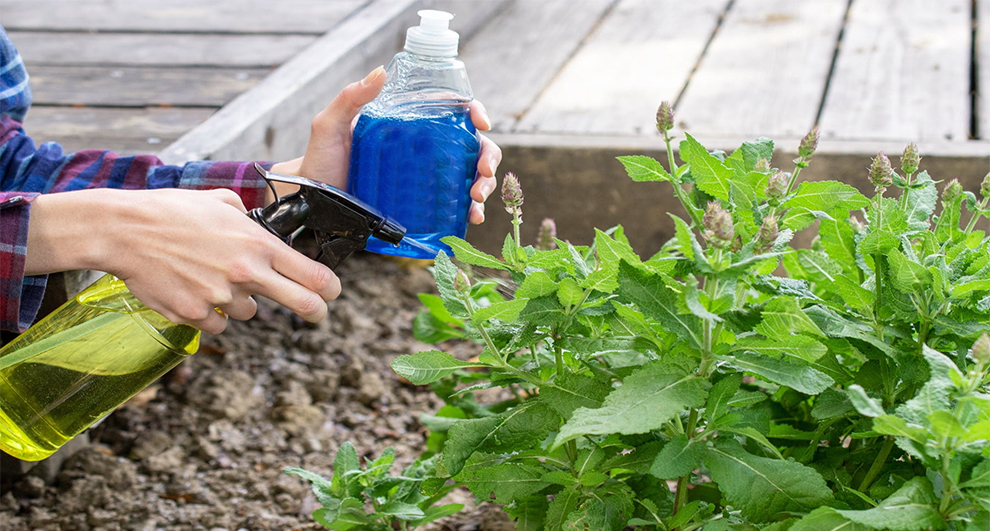
Essential oils contain compounds with insecticidal properties, which can be toxic to aphids. Different essential oils have distinct action mechanisms and work by disrupting the aphids’ digestive, respiratory, and nervous systems. Here are some essential oils that work:
- Clove oilhas eugenol, which is toxic to the aphids and can damage their nervous system.
- Peppermint oilcontains methanol that can cause death or paralysis in aphids.
- Rosemary oil has camphor and other compounds that can disrupt aphids’ reproduction and feeding.
In most cases, these oils are combined with soap and water. So, you can use them as a spray to coat the affected plant. Soap helps spread the oil and helps it stick to the aphids, whereas water helps dilute the oil, making application easier.
After the aphids are in contact with the essential oil mix, the toxic compounds in the oil can disrupt their bodily functions, which in turn causes them to die.
Even though essential oils help keep aphids in check, they may also harm beneficial pollinators and insects. Thus, you must selectively and carefully use them and not employ them on plants presently in bloom or attracting pollinators.
7. Diatomaceous earth (DE)
It is a natural and safe method of eliminating aphids. DE is a powdered substance containing fossilized microscopic sea creatures that cause tiny cuts on the insects that walk through it. These cuts can dehydrate them and eventually be the cause of their death. You will have to reapply it after rain or every few days as it loses its effectiveness when it comes in contact with water.
8. Natural predators
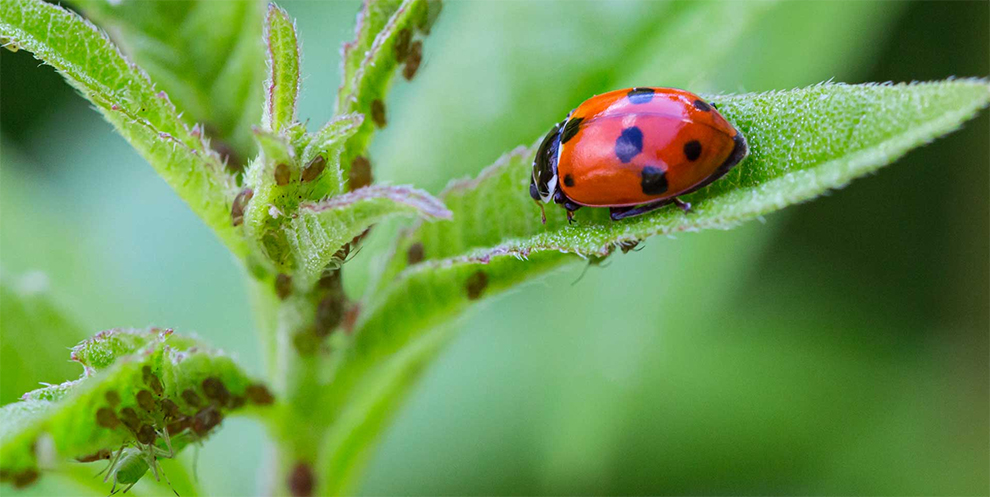
Want to know how to permanently get rid of aphids? We have one fool-proof method that works is introducing natural predators. They can be an effective means to control aphid infestation. Here are some natural predators that can help keep the aphid population in check:
1. Ladybugs: These are the common aphid predator. Adult ladybugs and their larvae feed on the aphids and consume 100s of aphids in a day.
2. Plastic wasps: There exist multiple species of parasitic wasps that help control the aphids by laying their eggs inside the aphids’ bodies. These wasp larvae can consume the aphids inside out, kill them, and cease the population.
3. Lacewings: It is another effective insect to control aphid infestation. Lacewings larvae are voracious aphid predators and can consume a number of them in a brief span.
4. Hoverflies: These are beneficial insects that look like wasps and bees but are harmless to humans. Hoverflies feed on aphids and help keep their population in check.
Other Infestation Problems: How to Get Rid of Gnats on Houseplants | Scales on Plants | Goat Heads | How to Treat Leafhoppers |Types of Lawn Fungus|Treat Fungus Gnats on Plants
How To Keep Aphids Away – Preventive Measures
We have discussed some ways to kill the aphids naturally, but prevention is always better than cure. So, here are some preventive measures that can help avoid the infestation:
1. Choose resistant varieties – Pick plant varieties that are naturally aphid-resistant, such as mint, chives, and marigolds. These naturally emit a natural insecticide that helps keep aphids at bay.
2. Employ companion planting – Planting herbs like basic or flowers like nasturtiums can help keep aphids at bay.
3. Remove weeds – It also helps prevent aphid infestation, as weeds can be a host for aphids and other pests. Moreover, weeds compete with plants for water, sunlight, and nutrients.
It can further weaken the plant and increase the likelihood of aphid infestation. So, consider removing them by hand-pulling the weeds, mulching the garden, using a hoe, or employing a weed mower or trimmer.
4. Keep ants in check – Ants are the farm aphids that shield the aphids from natural predators by moving them from plant to plant. Hence, controlling the ant population is another way how to get rid of greenfly (aphids). You can keep ants away by removing sugary and sweet food sources in the garden, such as honeydew excreted by aphids, sugar water, or fall fruit.
In addition, you must also take measures to block their access by using sticky barriers like Tanglefoot and employing ant baits, essential oils, or diatomaceous earth.
5. Keep the plants healthy – Healthy and robust plants are less likely to get an aphid infestation. So, please ensure that you water the plants on time and well-fed. In addition, you must also prune them regularly to eliminate damaged or dead plants.
6. Practicing good garden hygiene – Remove dead plant material, weeds, or debris from the garden by reducing the places where the aphids can breed or hide.
7. Use physical barriers – Netting or using the row covers can also prevent the aphids from accessing the plants.
How To Eliminate Aphids Permanently?
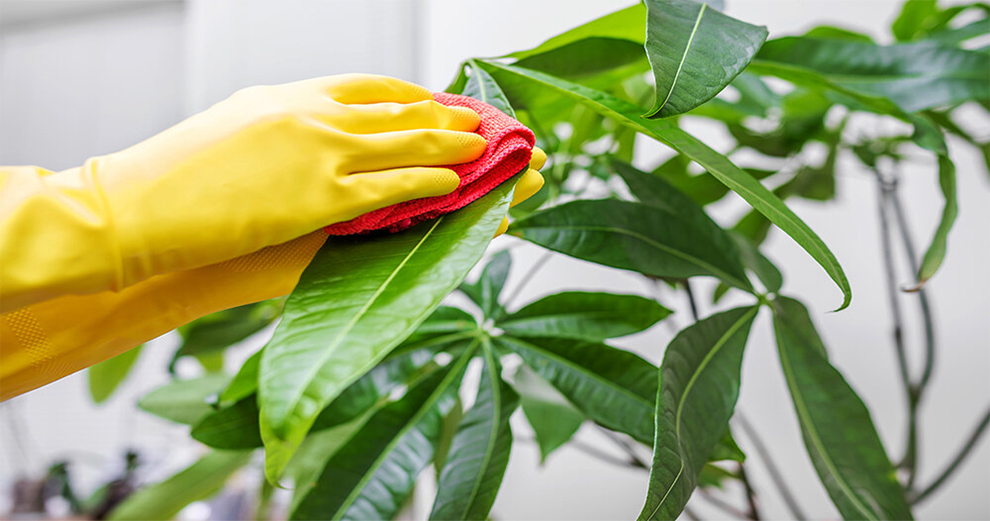
Some other methods to get rid of aphids permanently include:
1. Wiping the leaves – By wiping the leaves, you physically remove the aphids from the plants. These can lower the overall aphid population and decrease the damage inflicted on the plants.
While wiping, remove the overall aphid and its eggs from the plant. It intervenes with their life cycle and does not let them feed onto the plant or reproduce further. It is a non-toxic method that helps reduce aphid infestation on small plants or small-scale infestation.
2. Aphids control insecticide – We have listed several methods that answer your query on ‘how do you kill aphids’if nothing works, you can employ commercial insecticides to tackle a full-scale invasion.
You can either find these pesticides in convenient bottles or may have to mix and deploy them using a chemical sprayer.
Some popular options include:
- Bonide Insect Control Systemic Granules, 4 lbs.
- Bonide Systemic Houseplant Insect Control
- BioAdvanced 701810A Systemic Plant Fertilizer and Insecticide
- Compare-N-Save Systemic Tree and Shrub Insect Drench
However, please note these chemical insecticides can damage the plants and the beneficial predator species. So, please read through the instructions on the label and strictly use them as directed.
3. Cutting branches – If you cannot remove infestation by spraying with a hose or picking them, you should cut the branches to eliminate them permanently. However, before selecting the branch, ensure it has the most insects.
After cutting the branch, dip it in any aphid-repellent solution to kill the insects. Selected pruning can also help.
4. Trap crops – It is a scientific plant that attracts aphids, so they stay away from your plants. These are a variant of companion plants as they are effective when you grow them around your plants while simultaneously protecting them.
Since pests work their way from outside, you must plant these crops around your garden’s perimeter early in the season to give them ample time to bloom and spread before the main crop gets going. Some popular options include nettles, calendula, and nasturtiums.
5. Homemade aphid spray – You can make several homemade aphid sprays to control the infestation. Here are some recipes that work:
- Soap and water spray mix – Take 1 tbsp of mild liquid dish soap. Mix it with one quart of water. Shake well, and pour the mixture into the spray bottle. Now, spray it on the infected plants, covering both sides of the leaves. The soap helps break down the aphid’s body, causing them to dehydrate and die.
- Neem oil spray – Take 1 tbsp of neem oil. Mix it with one quart of water. Shake well, and pour the mix into the spray bottle. Now, spray it on the infected plants, covering both sides of the leaves. Neem oil has natural compounds that hamper the insect’s hormone system and does not let them reproduce or feed on your plants.
- Garlic spray – Take two to three garlic cloves and steep them in one quart of hot water for some hours. Strain the garlic and pour it in water in the spray bottle. Add 2-3 drops of dish soap, and spray the mixture on the affected plants. Garlic has natural compounds that are toxic to aphids.
How To Get Rid Of Aphids Permanently Indoors?
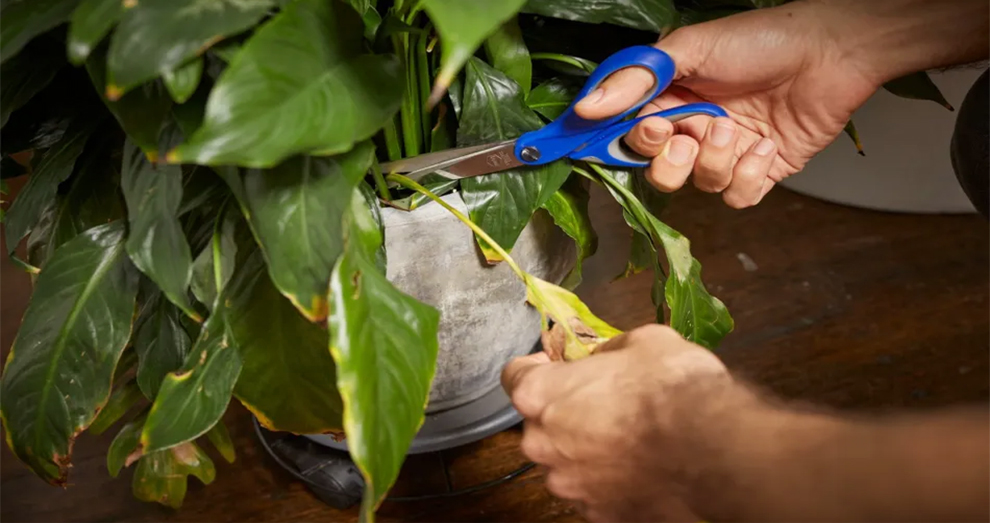
It can be challenging to tackle aphids indoors, but here are some steps you can take:
1. Identify and isolate the affected plants – Inspect your plants regularly and watch out for the signs, such as distorted growth, curled leaves, or sticky residue. If there is any infestation, isolate the plant to prevent its spread.
2. Wash the plants – To physically remove aphids from the leaves, strike a gentle water stream to wash the plants.
3. Use an insecticidal soap – The soap can suffocate the aphids and help kill them.
4. Apply a neem oil mix – It can disrupt their hormone system and curtail their reproduction and feeding.
5. Use sticky traps – Placing yellow sticky traps near the affected plants can also help catch aphids.
6. Introduce natural predators – Introducing natural predators like lacewings and ladybugs to your indoor gardens can also help control the aphid population.
7. Prevent future infestation – Inspect the plants regularly before bringing them indoors and use the above-listed steps multiple times till you ward off all the aphids.
What Does An Aphid Infestation Look Like?
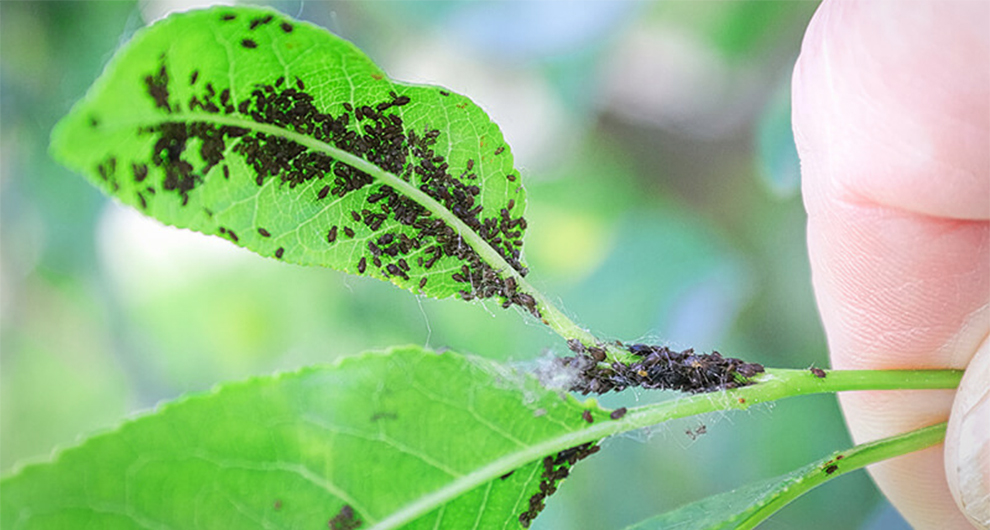
We have discussed how to control aphids, but you can only take remedial action if you know how to spot them. Here are some giveaway signs to identify the aphid infestation:
1. Yellowing or curling of the leaves: It is one of the most prevalent signs of aphid infestation and occurs when the aphids suck the sap from the leaves, leaving them discolored and distorted.
2. Black sooty mold: Honeydew produced by aphids can attract black sooty mold fungus, leaving the plant with a black-sooty appearance.
3. Stunted growth: Aphids can also result in stunted growth in plants since their feeding might hamper their ability to absorb water and vital nutrients.
4. Visible aphids: Sometimes, you can easily spot the aphids walking on the plant. You can see them as minuscule, pear-shaped insects in black, brown, yellow, or green color.
5. Sticky residue: Another symptom of an aphid infestation is a sticky residue on the surrounding surfaces and the leaves. It is called the honeydew, a byproduct of the aphids’ feeding.
So, if you spot any of these signs, employ our tips on how to get rid of greenfly immediately before they can cause significant damage to the plants.
What Kills Aphids But Not Plants?
You have several options to kill aphids without harming the plant, such as:
- Using insecticidal soaps
- Employing neem or horticultural oils
- Introducing beneficial insects
- Growing companion plants
What Smell Do Aphids Hate?
Acids are sensitive to various scents. A few of them that they specifically hate include:
- Garlic
- Onions
- Chives
- Mint
- Eucalyptus
Why Do Aphids Keep Coming Back?
Aphids might come back because of the following reasons:
- Poor plant health
- Lack of diversity or growing only the same type of plant repeatedly
- Growing plants too close to each other
- Re-infestation through birds, insects, or winds
- Treating only the visible infestation without tackling the root problem, like the presence of ants.
